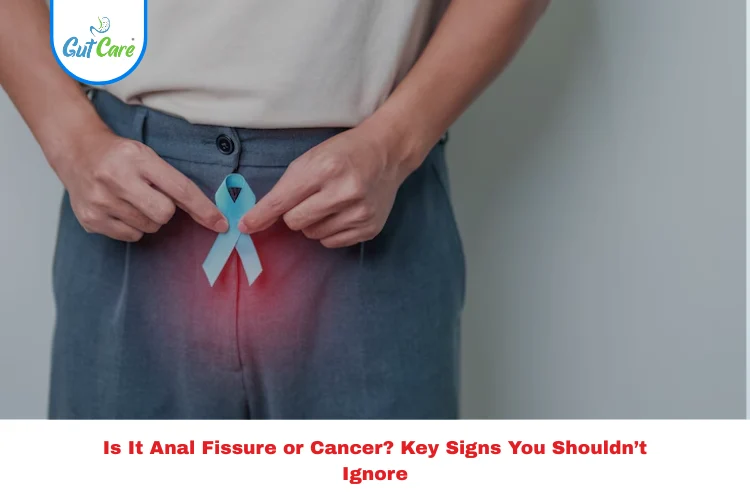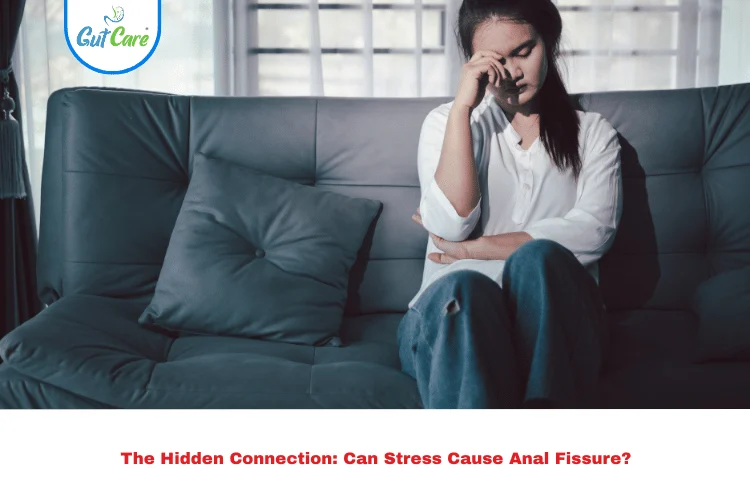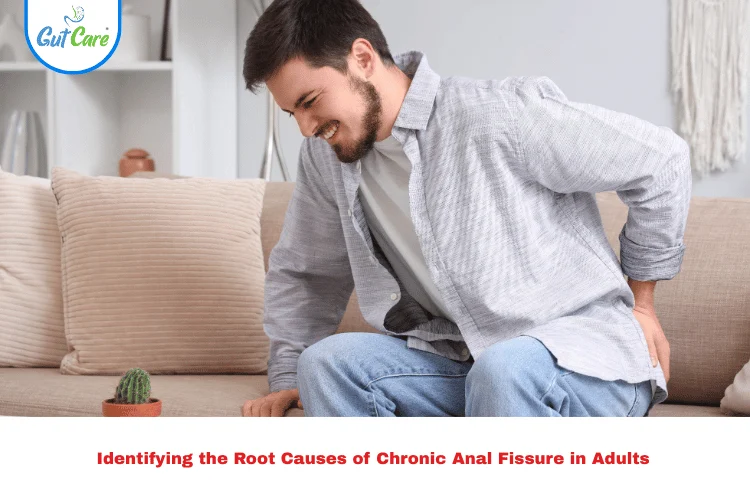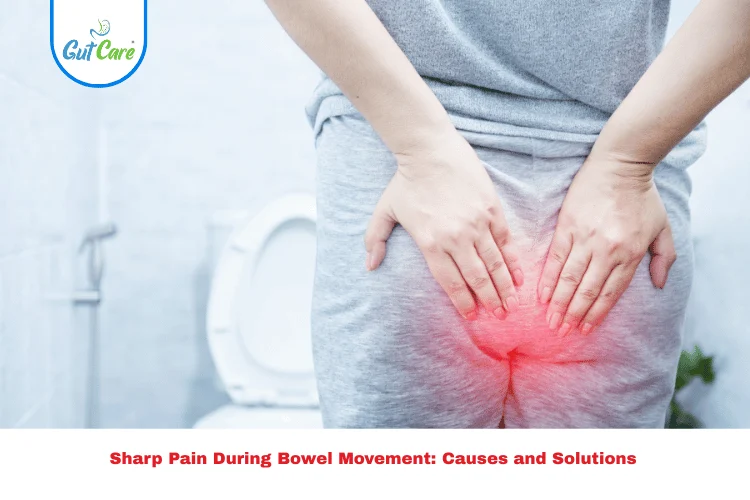Anal fissure or cancer? It’s a question that crosses the minds of many experiencing persistent rectal pain, bleeding, or discomfort. At GutCare Clinics, we understand the anxiety these symptoms can bring. While most rectal issues are caused by minor conditions like anal fissures, it’s crucial to understand the difference between a fissure and something more serious, such as colorectal or anal cancer. This guide will help you recognize the warning signs, understand the causes, and know when it’s time to see a medical expert.
Understanding the Basics: What Is an Anal Fissure?
An anal fissure is a small tear or cut in the lining of the anus. It often results from passing hard stools or straining during bowel movements. Though painful, fissures are generally benign and treatable with conservative measures.
Common Symptoms of Anal Fissure:
- Sharp pain during or after bowel movements
- Bright red blood on toilet paper or stool
- A visible tear in the anal skin
- Itching or irritation around the anus
- A small lump or skin tag near the fissure
These symptoms are typically consistent and tied directly to bowel activity. The pain from a fissure can be intense but usually subsides between bowel movements.
What About Anal Cancer? How Is It Different?
While anal fissures are common and often harmless, anal cancer is a rare but serious condition that arises from abnormal cell growth in the anal canal. Distinguishing between anal fissure or cancer can be difficult without professional evaluation.
Warning Signs of Anal Cancer:
- Persistent anal pain or pressure
- Bleeding unrelated to bowel movements
- A mass or growth in or around the anus
- Discharge or itching that doesn’t go away
- A change in bowel habits (such as narrowing of stool)
- Swollen lymph nodes in the groin or anal area
Unlike fissures, the symptoms of anal cancer may persist regardless of bowel movement and can worsen over time. It’s essential to consult a healthcare provider if symptoms linger beyond a few weeks or don’t improve with home treatments.
Anal Fissure or Cancer? Key Differences to Watch
Here’s a simple comparison chart to help you differentiate between anal fissure or cancer symptoms:
| Symptom | Anal Fissure | Anal Cancer |
| Pain | Sharp, during/after bowel movement | Constant, dull or sharp |
| Bleeding | Bright red, on stool or tissue | May be darker or continuous |
| Lump | Small skin tag | Larger, persistent mass |
| Duration | Improves with care | Worsens or persists |
| Other Signs | Itching, spasm | Discharge, weight loss, fatigue |
If you notice any persistent or worsening symptoms, particularly if they are accompanied by fatigue, weight loss, or unexplained bleeding, it’s vital to consult a specialist.
Causes and Risk Factors
Causes of Anal Fissures:
- Chronic constipation or diarrhea
- Straining during bowel movements
- Anal intercourse
- Childbirth (in some women)
Risk Factors for Anal Cancer:
- Human papillomavirus (HPV) infection
- History of anal warts
- Weakened immune system
- Smoking
- Age (more common over 50)
Treatment Options: Managing Anal Fissures
Most anal fissures heal on their own or with conservative treatment. Here’s how to manage them effectively:
1. High-Fiber Diet
Eating plenty of fruits, vegetables, and whole grains helps soften stools and reduce strain during bowel movements.
2. Hydration
Drinking enough water is essential to prevent constipation—a major contributor to fissures.
3. Sitz Baths
Soaking the anal area in warm water for 10–15 minutes several times a day can relieve discomfort and promote healing.
4. Topical Creams
Over-the-counter or prescribed ointments (like nitroglycerin or nifedipine) can help reduce pain and promote blood flow for healing.
5. Pain Relievers
Mild pain can be managed with non-prescription medications like acetaminophen or ibuprofen.
If symptoms persist beyond 6–8 weeks, surgical options such as lateral internal sphincterotomy may be recommended.
When to See a Doctor: Don’t Ignore These Signs
You should seek medical advice if:
- Bleeding is frequent or heavy
- Pain does not improve after a few days
- There’s a noticeable lump or mass
- You experience systemic symptoms like weight loss or fatigue
- You’re unsure whether it’s an anal fissure or cancer
Early diagnosis is critical. At GutCare Clinics, our gastroenterology specialists use advanced diagnostic tools like anoscopy, digital rectal exams, and biopsies to rule out serious conditions like cancer.
Prevention Tips
Preventing fissures and reducing cancer risk starts with healthy habits:
- Maintain regular bowel habits
- Avoid straining during bowel movements
- Use stool softeners if needed
- Practice safe sex
- Get screened for HPV if you’re at risk
- Quit smoking
Summary: Don’t Guess – Get Checked
If you’re dealing with rectal discomfort, it’s natural to worry about whether it’s an anal fissure or cancer. While fissures are far more common and generally harmless, ignoring symptoms can delay crucial treatment in rare cases of cancer. Simple, non-invasive evaluations can bring peace of mind and proper care.
At GutCare Clinics, our expert team is here to provide accurate diagnosis and compassionate care for all your gastrointestinal concerns.
Still Unsure? Talk to Our Experts Today
Don’t wait and wonder. Book an appointment with a GutCare Clinics specialist today to address your concerns about anal fissure or cancer. Early detection saves lives—and most cases of fissures can be managed quickly and effectively.
Contact GutCare Clinics for a consultation.
FAQs
1. How do I know if it is an anal fissure or cancer?
Anal fissures tend to cause sharp pains with bowel movements and bright red blood on the toilet paper. Cancer, on the other hand, may show a persistent mass, continued bleeding, or changes in bowel habits. If you are not sure if it is an anal fissure or cancer, you will need to get a proper diagnosis from a specialist.
2. Can I mistake anal fissure symptoms for cancer?
Yes, some of the symptoms, like rectal bleeding or pain, are similar, which is why it is important to not self-diagnose. If symptoms persist, the doctor will distinguish if it is an anal fissure or cancer after examination and tests.
3. Is bleeding a sign of anal fissure or cancer?
No. Although bleeding may be the most common symptom of anal fissure or cancer, bleeding can also happen due to hemorrhoids or infections. Bright red blood is typically due to anal fissures, as cancer may show brighter blood or some dark bleeding which may come on more “continuously”.
4. When should I see a doctor for anal fissure or cancer symptoms?
You should see a health care provider after rectal pain or bleeding lasts for two weeks or longer, and pain and bleeding gets worse. Persistent or excessive symptoms should be examined to ascertain that an anal fissure or anal cancer is not present.
5. What is the best treatment for anal fissure or cancer symptoms?
Anal fissures can treat with sitz baths, changes in diet and ointments. Anal cancer need more sophisticated care like radiotherapy or surgery. Good medicine is dependent on finding whether it is an anal fissure or anal cancer, thus an examination by professionals is critical.




